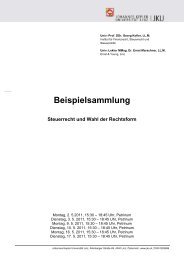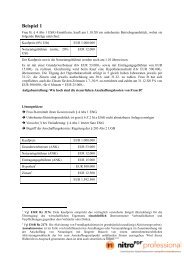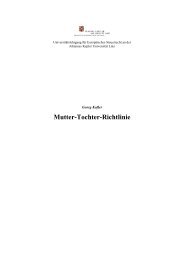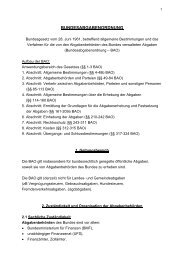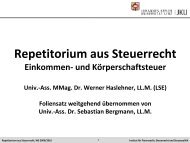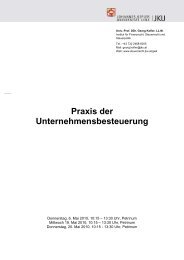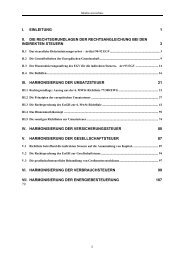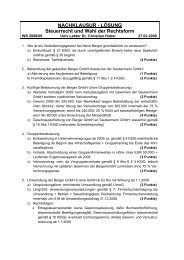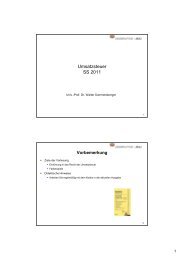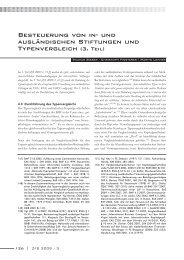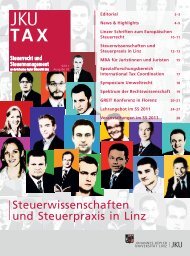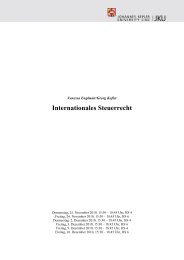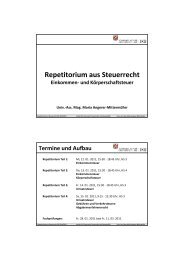European Tax Law - JKU
European Tax Law - JKU
European Tax Law - JKU
Erfolgreiche ePaper selbst erstellen
Machen Sie aus Ihren PDF Publikationen ein blätterbares Flipbook mit unserer einzigartigen Google optimierten e-Paper Software.
<strong>European</strong> Union<br />
This article is the basis for the Graduation<br />
Lecture (Maarten J. Ellis Lecture) delivered by<br />
Prof. Frans Vanistendael on 30 August 2007 at<br />
the International <strong>Tax</strong> Center Leiden (LLM<br />
Program in International <strong>Tax</strong>ation) at the<br />
University of Leiden, the Netherlands.<br />
1. Introduction<br />
Criticism of the tax decisions of the <strong>European</strong> Court of<br />
Justice (ECJ) is a venerable tradition in the <strong>European</strong><br />
Union. 1 The former Dutch State Secretary of Finance,<br />
Willem Vermeend, characterized the decisions of the<br />
ECJ as the “Alice in the Wonderland” of fiscal legislation, 2<br />
while David Williams, the distinguished British professor<br />
and judge, once described the ECJ as “the power to<br />
destroy”. 3 At the end of 2006, the German Minister of<br />
Finance characterized an opinion of the Advocate-General<br />
as “unreasonable” and “completely incompatible and<br />
in violation of the fundamental interests of a Member<br />
State and its citizens”. 4 From across the Atlantic, Alvin<br />
Warren and Michael Graetz sent the message in The Yale<br />
<strong>Law</strong> Journal that “[o]ur principal conclusion is that the<br />
<strong>European</strong> Court of Justice (ECJ) is undermining the fiscal<br />
autonomy of member states by articulating an interpretation<br />
of income tax arrangements that is ultimately<br />
unstable”. 5 Finally, most recently, similar criticisms were<br />
formulated in abundance at the annual meeting of the<br />
<strong>European</strong> Association of <strong>Tax</strong> <strong>Law</strong> Professors (EATLP) in<br />
Helsinki in June 2007, where four young and promising<br />
tax professors, Dennis Weber, Raymond Luja, Francisco<br />
Alfredo García Prats and Pasquale Pistone, debated with<br />
experienced judges and academics the question of<br />
which way the ECJ should go. 6 This criticism echoes the<br />
critical remarks by Julian Ghosh in his recent book Principles<br />
of the Internal Market and Direct <strong>Tax</strong>ation. 7 The<br />
purpose of this lecture is to (1) summarize the essence of<br />
these criticisms, (2) find out whether they are justified,<br />
and (3) consider the direction in which the Court should<br />
go. The title of the lecture gives an indication of my<br />
opinion on the first two questions.<br />
2. Summary of Criticisms Levelled at the ECJ<br />
Although one of the major criticisms is the inconsistency<br />
in the reasoning of the ECJ in tax matters, this<br />
summary reveals that the critics themselves do not<br />
always point in the same direction and that the criticisms<br />
are therefore not always consistent with each<br />
other.<br />
2.1. The ECJ exceeds its judicial powers and infringes<br />
on the fiscal autonomy of the Member States<br />
This thesis, which is also often heard in Europe, is best<br />
documented by Graetz and Warren when they wrote in<br />
Articles<br />
Prof. Dr Frans Vanistendael*<br />
In Defence of the <strong>European</strong> Court of Justice<br />
their learned article: “The ECJ decisions to date suggest<br />
potentially staggering constraints on countries’ freedom<br />
to resolve what strike us as quintessentially legislative<br />
issues – constraints that are fundamentally inconsistent<br />
with the fiscal autonomy retained by the member states<br />
in their right to veto EU taxing provisions.” 8 They<br />
pointed to the fact that it is impossible to achieve simultaneously<br />
capital-export neutrality (CEN) and capitalimport<br />
neutrality (CIN) in a single tax system: “The conflicts<br />
underlying this impossibility result can produce<br />
irreconcilable claims of discrimination.” 9 On the other<br />
hand, they argued that, based on the concept of discrimination,<br />
there are no theoretical arguments to prefer<br />
CIN over CEN and therefore that the ECJ would not be<br />
entitled to make a choice:<br />
There is simply no principled basis to prefer it [CEN] over the<br />
opposite argument that exemption of foreign income (and<br />
source taxation) is discriminatory. Putting the point more generally,<br />
prohibiting discrimination based on destination is ultimately<br />
inconsistent with prohibiting discrimination based on<br />
origin. This indeterminacy confirms the limits of nondiscrimination<br />
as a tool for resolving basic issues of international taxation.<br />
The core tax policy issue here is the division of the tax base<br />
between source and residence countries, the resolution of which<br />
has depended more on compromise and practice than on any<br />
overarching principle. Regulating that division by reasoning<br />
from a principle of nondiscrimination ultimately produces an<br />
incoherent result. 10<br />
* Prof. Frans Vanistendael is the Academic Chairman of the IBFD and<br />
Director of the <strong>European</strong> <strong>Tax</strong> College.<br />
1. See Avery Jones, John, “Carry on Discriminating”, <strong>European</strong> <strong>Tax</strong>ation 2<br />
(1996), at 46, 49, criticizing the Wielockx and Schumacker decisions: “What is<br />
needed is some independent body which can give the Court the big picture<br />
when the Court’s attention is focused on one small, and ... deceptively simple,<br />
area.”<br />
2. Vermeend, Willem, “The Court of Justice of the <strong>European</strong> Communities<br />
and direct taxes: ‘Est-ce que la justice est de ce monde’?”, EC <strong>Tax</strong> Review<br />
1996/2, at 54, 55.<br />
3. Williams, David, “Asscher, the <strong>European</strong> Court of Justice and the power<br />
to destroy”, EC <strong>Tax</strong> Review 1997/1, at 4: “The flaw to which I refer is the effect<br />
of the <strong>European</strong> Union law on the tax and social security systems of the Member<br />
States, and the creation with the power to destroy is the <strong>European</strong> Court<br />
of Justice.”<br />
4. Press release of the German Ministry of Finance of 5 October 2006 on<br />
the day of the submission of the opinion of Advocate-General Stix-Hackl in<br />
Meilicke, Case C-292/04.<br />
5. Graetz, Michael J. and Alvin C. Warren, “Income <strong>Tax</strong> Discrimination and<br />
the Political and Economic Integration of Europe”, 115 The Yale <strong>Law</strong> Journal<br />
1186 (2006), at 1188.<br />
6. The reports submitted by Raymond Lula (Maastricht University), Dennis<br />
Weber (Amsterdam University), Francisco Alfredo García Prats (University<br />
of Valencia) and Pasquale Pistone (University of Salerno and Economic<br />
University of Vienna) together with the other proceedings of the annual<br />
meeting of the EATLP are published in Accounting and <strong>Tax</strong>ation & Assessment<br />
of ECJ Case <strong>Law</strong>, 2007 EATLP Congress, Helsinki (2008).<br />
7. Ghosh, Julian, Principles of the Internal Market and Direct <strong>Tax</strong>ation<br />
(Oxford Key Haven Publications, 2007), at 266.<br />
8. Graetz and Warren, supra note 5, at 1207.<br />
9. Id. at 1217.<br />
10. Id. at 1219.<br />
90 BULLETIN FOR INTERNATIONAL TAXATION MARCH 2008 © IBFD




